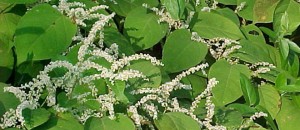First, what is polydatin? Have you ever heard of it? I hadn’t…before this morning. Well, in short, it’s extracted from Japanese knotweed, a large, herbaceous perennial plant of the knotweed and buckwheat family Polygonaceae.  The description sounds quite innocuous, but in fact this plant is far from innocuous. It’s a terribly invasive, almost impossible-to-get-rid-of WEED that can take over huge expanses of land if unchecked, and its rhizomes can even cause extensive damage to building foundations, walls, and whatnot. Okay, well, there go my first thoughts of planting some in the back yard. Oooops, not happening!!!
The description sounds quite innocuous, but in fact this plant is far from innocuous. It’s a terribly invasive, almost impossible-to-get-rid-of WEED that can take over huge expanses of land if unchecked, and its rhizomes can even cause extensive damage to building foundations, walls, and whatnot. Okay, well, there go my first thoughts of planting some in the back yard. Oooops, not happening!!!
But forget the plant. What should interest us is Its extract, polydatin, which has been shown to inhibit “the proliferation of leukemia, breast cancer, lung cancer, cervical cancer and liver cancer.”
So the newly-published Chinese study I read this morning on the effects of polydatin and myeloma didn’t just come out of the blue but is backed by a number of scientific studies…In fact, I just found a study on polydatin and laryngeal cancer in PubMed…published just two days ago…
Oh, before I forget, the full polydatin and myeloma study is available for free on PubMed. Just click here: goo.gl/kZex2M
Interesting aside: as we can read in the abstract, in addition to its anti-cancer effects, polydatin has a bunch of other abilities, such as reducing blood lipids (and that is a great bit of info, considering what we know now about cancer cells and lipids, see my March 4 2017 post) and protecting us from strokes. Yes, interesting indeed…
Note: this study tests polydatin on cells, not people. But even so, the results, on the myeloma RPMI 8226 cell line, are quite amazing: the more polydatin was added to the mix, the more these myeloma cells stopped proliferating. The MM cells eventually died. DIED.
Super duper.
Now, the only thing that slightly concerned me was in the Discussion part, where the researchers state that polydatin was found to be less toxic to normal cells. Does that mean it was somewhat toxic to normal cells, though less so, compared to cancer cells? I couldn’t find an answer…can anyone else find it?
Reading on, we see that polydatin (or PD, for short), “functioned as a tumor suppressor in MM cells. The proliferation of MM cells decreased and apoptosis increased progressively along with the increasing concentrations of PD.” Super duper…again.
The study concludes that “PD effectively suppressed cell growth and induced apoptosis and autophagy in MM cells through mTOR/p70s6k signaling pathway in vitro, which indicates that PD could be used as a potential anticancer drug for MM treatment. However, further research is needed to explore the anticancer effect of PD in vivo.”
Just one last comment on mTOR, that is, polydatin’s target. And here I’m taking from my own research: mTOR is a really nasty pathway involved with myeloma disease progression. When mTOR is activated, MM cell lines resist being killed. Obviously, not good at all. And, in fact, if you do a search of PubMed, mTOR inhibitors are being developed all over the place to treat myeloma.
Okay, so more studies (in vivo ones, especially) are needed, blablabla. But what I find tremendously significant is that this new study proves that the interest in finding new plant extracts that might possibly be useful in the treatment of myeloma and other cancers is live and well.
And that can only be a very GOOD thing…!!!